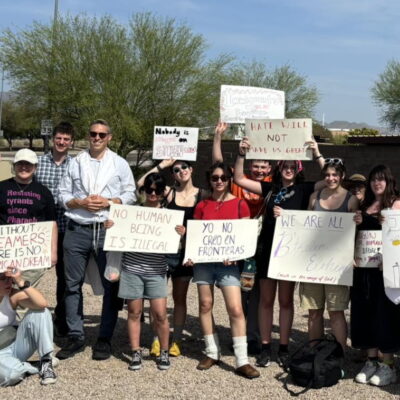Emergency response
Israeli nonprofits tout psychological first aid, but there isn’t solid proof it prevents PTSD
Studies show some methods can help in the short term, but don’t necessarily stave off long-term effects of traumatic experiences

Getty Images
Hadas Rucham knows trauma. As operations manager of United Hatzalah’s Psychotrauma and Crisis Response Unit and a social worker for nearly 15 years, she’s often the first on the scene after a severe traumatic event.
She’s calmed mothers after their baby received CPR, soothed family members after they witnessed domestic violence and helped stabilize eyewitnesses after a car crash, a major fire or a terror attack.
Last year, she arrived at an apartment in Netanya, Israel, to find sisters, ages 14 and 17, stunned silent. They discovered their 40-year-old father unconscious after hanging himself in a suicide attempt.
“They couldn’t speak. They couldn’t walk. They were just freezing,” Rucham told eJewishPhilanthropy. “We call it the silent terror. One of them was dissociative, and the other was in shock. She was restless and confused. And just minutes after that, when we came, and we asked them questions, and we made them be useful and functional, they just came out of that.”
Rucham had implemented the Six C’s method of psychological first aid, also known as the “Ma’ase” model. Six Cs stands for communication, commitment, cognition, continuity, control and challenge, and can take as little as 90 seconds to put into use. The method was chosen by Israel’s Supreme Council for Mental Health to become the national model of psychological first aid in 2017.
Rucham asked the girls to tell her what happened, to provide their father’s medical history, to gather a hospital bag. Soon, they went from feeling helpless to feeling like they had some control over the situation, Rucham recalled.
It was “like [they were] coming out of a bad dream,” she said. “They just woke up and started to cry. This is a good sign. They are responsive. They are starting to realize what happened and coming back to us, to the here and now.”
The natural reaction to seeing someone in shock is to offer support, hand them a tissue, give them a hug, but the core principle of the Six Cs method is to empower the person by showing them that they still have control over their actions and decisions. This is done by prompting them to help with a task, asking them questions and giving them choices.
The Six Cs method is just one of many interventions that use the title “psychological first aid” around the world. Nonprofits promote their initiatives using that blanket title in marketing and fundraising campaigns, but like other psychological first aid methods, including the World Health Organization’s recommended version, there is scant research on the Six Cs method’s effectiveness, especially related to long-term post-traumatic stress disorder.
“People love [psychological first aid] and want to implement it. And yet the evidence for whether or not it works just doesn’t seem to be there,” Sabrina Hermosilla, a social epidemiologist and assistant professor at Columbia University’s Mailman School of Public Health who has researched the effectiveness of the practice, told eJP.
Developed by Moshe Farchi, the head of the social work department at Tel-Hai College in northern Israel, the Six Cs method is now used by the Ministries of Education, Health, Internal Security in Israel, Israel Police, the Israel Defense Forces and nonprofits, including United Hatzalah, Magen David Adom, Natal, Israel Trauma Coalition, IsraAid and Natan.
Some agencies, including United Hatzalah, implement the Six Cs alongside the WHO’s psychological first aid model — a distinct practice based on a different underlying premise — with the terms used interchangeably, including at times by Farchi. On agencies’ websites and promotional material, the term psychological first aid is listed as an intervention without any explanation of what it means or the methods used.
In United Hatzalah’s annual report, psychological first aid is listed with no mention of the version it is referencing. On its website, inches away from a “Donate Now” button, it says, “In addition to emergency medical treatment, this unit provides Israel’s people with psychological first aid on scene, and thereby prevent Post Traumatic Stress Disorder (PTSD), in addition to urgent medical relief.”
“PFA [psychological first aid] is used by many different [organizations], both as a technical term and often as a general term, and that causes no end to the confusion,” Hermosilla said.
The term is everywhere. When Hurricane Harvey hit Texas, a blog post went up on United Hatzalah’s website, titled, “Israel Rescue Coalition Sending Psychological First Aid Team To Help in Houston.” On Instagram, United Hatzalah promoted itself for bringing psychological first aid to Florida after the Surfside condominium collapse. They publicized it after Hurricane Ian and Hurricane Fiona. Promoted it around their work in Ukraine. After a new mom collapsed in Jerusalem two years ago, the organization published a blog post on Medium, titled, “Dog Unit Provides Psychological First Aid After The Loss of A Young Wife.”
The official website for the The International Center for Functional Resilience, of which Farchi is the co-founder and president, which markets the Six Cs method and provides trainings in it, claims that the method is “Proven effective in actual emergency events” and that “the Six Cs model allow an individual to return to full effective functioning within minutes during a challenging event and reduce the risk of secondary traumatization to a minimum.”
Training in the Six Cs method can take anywhere from five minutes to 1.5 hours and is often provided to anyone who works with people affected by trauma. Many recipients are medics. Few are professional therapists.
“The reason that it became very popular is because it’s evidence-based, in my opinion,” Farchi told eJP, “and it’s technically very, very simple to use.”
The evidence he refers to is just over a handful of journal publications, some of which aren’t actually studies. One study looks at the effects of the training on those being trained, not on those receiving the intervention. One study features a sample of 211 people who were given the intervention. They received follow-up phone calls about the intervention’s effects two and four months after receiving it. There was no comparison group.
Another study featured 63 participants who listened to a three-minute audio recording of a 911 call and were then either given the Six Cs method or a “supportive emotional expression.” Results were then gathered immediately and five minutes later, with anxiety, participants’ anxiety, heart-rate variability and mental resilience levels documented. All three studies showed positive results, but Hermosilla said that is not necessarily sufficient.
“The issue is an old one, how much is enough ‘evidence’ to be called evidence-based?” she said. “There is what may be categorized as ‘some emerging evidence’ that [the Six Cs method] could be effective. However using this scant evidence to have such governmental and non-governmental support seems unwise. Use this time and money to build the evidence base to better meet the needs of those being served. It’s the least we owe those with whom we work.”
Making false claims is dangerous for organizations, Anthony D’Angelo, the interim department chair in public relations at Syracuse University, told eJP. It’s a maneuver that can cost you the support and faith of your donors.
An organization’s relationship to donors “is ultimately built on trust,” he said. “That’s it. That’s the end game… And so trust, once it’s built up over time, and it can be very hard-won, it can be lost, fractured or destroyed, even with a single act.”
Instead, it’s better to just be honest and not make false claims, he said. “Prevention is much easier than if you break trust.”
The difficulty with studying any psychological first aid method is that “you just need really large sample sizes,” said Hermosilla. “You need people who are competent and experienced in research in these settings, which is a very small group. And you need multi-level[s of input]. A lot of studies rely on individual report[s] or interviews. To get that firm bit of linking, you need data from health centers, from who goes to seek care, and things like that. So you really need a lot of information from a lot of people. And that’s expensive and hard to do.”
Most studies on psychological first aid consider the intervention a success if a recipient is offered additional services to look into themselves, but there is no documentation on if they actually used those services.
Additionally, the majority of people who go through a traumatic event will recover naturally, so a large sample size with a control group is needed so the study can monitor those who wouldn’t, Hermosilla said.
This isn’t the first time an intervention was rolled out across the world on a massive scale without proof of its outcome. During the late 1980s and ‘90s, Psychological Debriefing, a form of group therapy typically provided within a single one-to-three-hour session where witnesses of traumatic events debrief and learn about common reactions to trauma, was the favored method. But in the early aughts, when studies were finally done, it was deemed to be potentially dangerous because it could increase the risk of PTSD and depression, instead of mitigating it.
“After the World Trade Center attack, there was a huge interest in early intervention for people affected by traumatic events,” Rodrigo Figueroa Cabello, a psychiatrist and professor at Amsterdam UMC who researches psychological first aid, told eJP. Without Psychological Debriefing to fall back on, out of desperation, “psychological first aid started to be widely used all around the world without any strong evidence on its effectiveness or safety.”
In 2022, Hermosilla participated in a systematic review of 9,000 reviewed citations of psychological first aid, mainly referring to the WHO’s recommended version. Out of all those, only 12 studies looked at outcomes and only one had a randomized control trial. “Although the results of these studies suggest that PFA may improve mental health and psychosocial well-being among individuals exposed to [potentially traumatic event]s, inconsistent intervention components, insufficient evaluation methodologies, and high risks of bias within the included studies challenged our ability to evaluate PFA’s programmatic effect,” the study says.
Recent studies, done by Figueroa Cabello and peers, including one presented last month at the 17th biennial conference of the European Society for Traumatic Stress Studies, “Trauma and resilience through the ages: A life course perspective,” found that the WHO’s recommended version of psychological first aid showed no proof that it lessened PTSD in the long term, though it was also found to, at least, not be harmful like Psychological Debriefing. Yet there were many positive discoveries of short-term effects: People who received the WHO’s recommended method showed less dependence on alcohol and other substances soon after the trauma, had less interpersonal conflicts, and used less sick time at work.
Figueroa Cabello hopes that his studies will push more agencies to implement it because the short-term results are positive. “I think that these findings reinforce the idea that PFA is not enough,” he said. “It’s just a link in the chain of continuum of care.” To truly target PTSD, he believes, additional services need to be provided beyond psychological first aid.
The WHO’s recommended method may not be evidence-based, but it is evidence-informed: Individual steps taken in the method — which includes taking a needs assessment, nonjudgmentally listening, implementing coping strategies and referring recipients to additional services — have been proven to prevent PTSD by themselves. It’s using the steps together that lacks evidence.
But Farchi said he created the Six Cs as an alternative to other forms of psychological first aid that he felt focused too much on the emotions, which only caused the recipient to sit more in their trauma. He therefore focused his method on cognitions and behavior.
Figueroa Cabello said, via email, that Farchi’s assumptions are contrafactual. “No sound evidence shows that ‘re-balancing’ cognitions-emotions-behaviors will prevent adaptive coping or post-trauma disorders,” he said. And “standard PFA indeed pays attention to cognitive/behavioral dimensions.”
There is hope that more research can be done on psychological first aid interventions, Hermosilla said, because research is easier to do now than ever. Data used to be collected with pen and paper, but thanks to technology, surveys are easier to implement and data easier to transfer.
“Doing nothing is insufficient,” she said. “We have a humanitarian imperative to respond,” especially since so much money is invested in these interventions by governments and donors.
However, Farchi said studies on reducing PTSD aren’t necessary because reducing PTSD is not the goal of his treatment. “From my point of view, the success of first aid is whether you succeeded to provide the first aid, and this is about encouraging the person to be active, effective and independent… The reduction of PTSD symptoms is a byproduct which I’m sure the PFA contributes to.”
Rucham, who has used the Six Cs method while helping in Ukraine and the United States, said the method “works like magic in the field.” She confidently promotes the method because she says she witnesses the evidence firsthand in her professional life where she often works with client’s long term and sees the positive effects on those who received the Six Cs in the past, compared to those who had witnessed trauma and hadn’t.
“Research is very important,” Rucham said. “But when you’re in the field, and you see people react, you understand that you’re doing good. You see it in their eyes. I don’t need the research. I have it every day.”













